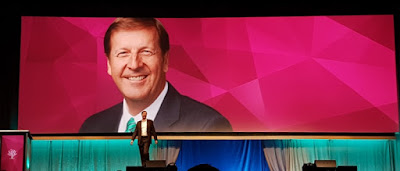Having sat through and having been underwhelmed by most of the keynote presentations at
Congress has caused me to reflect on what I expect from a keynote presentation.
Am I being harsh in expecting a keynote presenter to display passion for his/her subject, to tailor the talk for the particular audience, to have sufficient slides and content to fill the alloted time and to have a coherently organised presentation? Keynote presenters should also know their subject and not have to read from a prepared speech.
I expect a keynote to do more than one of these things: Inspire, Challenge, Educate, Engage, Entertain and Inform. It is a privilege and an honour to be invited to present a keynote; a sense of responsibility and ethical behaviour should be demonstrated by those given this honour.
Julie Arduini says "Keynote presentations are motivational speeches designed to excite the audience for the rest of the event. When keynote presenters deliver a speech, they know what aids to bring and implement to supplement their speech. Keynote speakers have public speaking experience and are known for their ability to educate, inform and entertain."
So how did the keynotes at Congress measure up? Thankfully the opening keynote of the Conference, Colleen Fitzpatrick, did not disappoint. She displayed a passion for her field of forensic genealogy while informing us and challenging us to think outside the square. That she tugged at our emotions was a bonus. I enjoyed her keynote so much that I attended two more of her talks.
Sadly none of the other keynote speakers similarly affected me.
Daniel Horowitz started off well by connecting with the audience, injecting humour into his talk and having good supporting slides. After his first 25 minutes of talking about his advertised topic he digressed. That he used the remaining half of his talk to promote his company's product to the exclusion of other products was unethical and unforgiveable.
Jenny Higgins from the
National Library of Australia gave an informative presentation on the services of the Library that would have been a good ordinary session. Jenny read her prepared talk causing her to lose eye contact with the audience and thus spontaneity. This competent presentation was well-prepared, supported by appropriate slides and full of information for those who do not use the services of our National Library
Chair of the Federation of Family History Societies, David Holman's after lunch keynote "Fascinating facts and figures" captivated the audience with his unique perspective. David's talk was pure entertainment that got us thinking. He displayed a great depth of knowledge of and a passion for his subject. Another blogger Kylie Willison said: "I thoroughly enjoyed David’s talk as I’m sure many people did going by the audience’s laughter. David shared figures of the most common surnames and forenames in different countries. He also spoke about uncommon and funny names and combinations of fore and surnames. I didn’t write anything down because I was so interested and entertained by what David was saying." David was a worthy keynote presenter.
John Kitzmiller finished his talk and slides in 25 minutes. He then spent the remainder of his time waffling on about this and that. This was unforgiveable in a keynote - did he not have a practice run and time himself before he presented? Another blogger commented that he should have let us go early and enjoy a longer morning tea break.
I missed Vicki Eldridge's keynote as I was busy working on a stand in the Exhibition Hall so I am unable to comment on her talk.
Stephen Young from Familysearch managed to spend an hour delivering a commonsense message, "Descendancy research: when you can't climb up your family tree, branch out", that could have been delivered in ten minutes. The content and topic of this talk was not appropriate for a keynote presentation.
I had heard
Dan Poffenberger's talk on handwriting analysis and was impressed by his relaxed style, good content and sense of humour. Dan's closing keynote "Familysearch 2012 and beyond" confused me. The news Dan related seemed to differ from what I had heard at the
Rootstech Conference in February. Dan just didn't seem to have the depth of knowledge of the Familysearch organisation that the speakers at Rootstech possessed.
Some of the American presenters did not tailor their presentations to Australian audiences but just presented talks previously prepared for US audiences. Quite a number of attendees commented on this issue. Some of the keynote presenters used the same examples in their keynotes that they used in breakout sessions; keynotes deserve all new material.
Most of these sessions should not have been labelled as keynotes but rather as plenary or general sessions that all members of a group attend. Some would have been better as breakout sessions.
Only two of the Keynotes were from Australians and one was from a Brit. There was not a Kiwi in sight; I found this strange in a Conference that is billed as Australasian. Having four Keynote presenters from the US confounded me. The Congress was billed as "on Genealogy & Heraldry" yet none of the Keynotes addressed the topic of Heraldry.
From my perspective the programming was the weak point of this event that I otherwise thoroughly enjoyed.
What do you expect from a Keynote?









